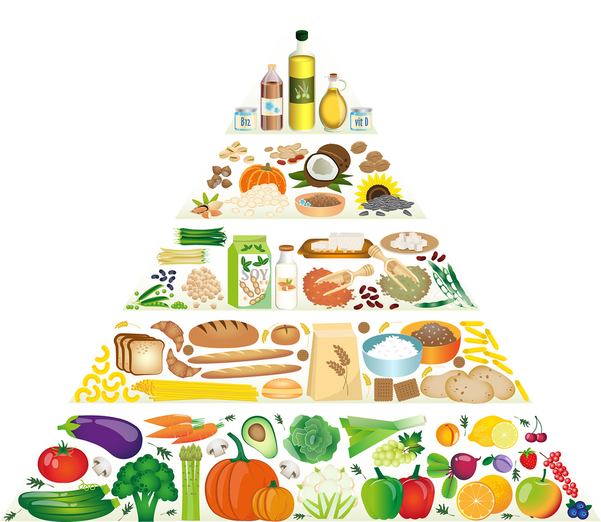Dietary Protein: Plants vs Animals
Protein is an essential macronutrient responsible for daily bodily functions. Protein is made up of 20 amino acids, 9 of which are essential meaning they are not produced by the body like the other 11. The essential amino acids are found in high amounts in animal-based products but are limited in plants. However, with the high environmental and health impacts of meat consumption, the spotlight is shifting towards plant-based diets as a source of protein.
Animal meats have been linked to higher rates of obesity with rates up to 40% in American adults and other diseases such as heart disease, obesity, metabolic syndromes, and GERD due to higher levels of saturated fat and lower levels of fiber in meat. Despite animal-based diets having higher levels of essential amino acids such as leucine than plant-based diets, which can be connected to increased muscle building, studies have shown that it is not the type of diet, but the amount of protein consumed that affects muscle building. Some studies have been conducted to show the difference between the type of protein and the amount of protein in muscle synthesis. A study conducted by Babault et al. showed that bicep muscle thickness increased in individuals who had taken pea protein compared to that of whey protein or placebo. Another study in 2021 showed that muscle protein synthesis rates showed no difference with the type of protein ingested.
Protein is primarily found in plants and animals. As mentioned before, the human body needs 9 essential amino acids which can only be absorbed through dietary sources.There are alternative sources of protein found in plants, yet Plant and animal protein sources contain different compositions of amino acids. Animal proteins have all essential amino acids in excess, which are referred to as “complete proteins”. On the other hand, while plant-based foods do contain some essential amino acids, some amino acids may be low in quantity, and therefore can be considered “incomplete” proteins.
Animal meats have been linked to higher rates of obesity with rates up to 40% in American adults and other diseases such as heart disease, obesity, metabolic syndromes, and GERD due to higher levels of saturated fat and lower levels of fiber in meat. Despite animal-based diets having higher levels of essential amino acids such as leucine than plant-based diets, which can be connected to increased muscle building, studies have shown that it is not the type of diet, but the amount of protein consumed that affects muscle building. Some studies have been conducted to show the difference between the type of protein and the amount of protein in muscle synthesis. A study conducted by Babault et al. showed that bicep muscle thickness increased in individuals who had taken pea protein compared to that of whey protein or placebo. Another study in 2021 showed that muscle protein synthesis rates showed no difference with the type of protein ingested.
Protein is primarily found in plants and animals. As mentioned before, the human body needs 9 essential amino acids which can only be absorbed through dietary sources.There are alternative sources of protein found in plants, yet Plant and animal protein sources contain different compositions of amino acids. Animal proteins have all essential amino acids in excess, which are referred to as “complete proteins”. On the other hand, while plant-based foods do contain some essential amino acids, some amino acids may be low in quantity, and therefore can be considered “incomplete” proteins.
Image Source: LyfeFuel
Additionally, plant proteins are harder to digest, due to differences in structure and absorption rates.Plant-based proteins lack essential amino acids such as leucine, isoleucine, valine, lysine, and methionine. However, plant-based diets have many health and environmental benefits that should be considered. Plant-based diets can be linked to a decrease in body weight due to their high fiber content which increases satiety, suppresses appetite, and increases total calorie intake. High fiber intake can also lower the risk for gastrointestinal diseases such as GERD and inflammatory diseases since fiber decreases inflammation and stops the growth of infectious microorganisms called pathogens. Plant-based diets can also lower the risk of diabetes, blood pressure, cholesterol, and cardiovascular diseases. Plant-based diets are also beneficial to the environment as plants require less water and land and release less air pollution into the air compared to livestock
Plant-based diets need careful adjustment in order to meet dietary requirements. for example, vegetarians have a higher essential-to-nonessential amino acid ratio compared to that meat eaters. One of these amino acids is leucine which many plant sources lack. Another deficiency found in plant-based diets is a lack of certain micronutrients such as vitamins B12 and D, calcium, zinc, long-chain fatty acids, and iron. However, all of these drawbacks can be solved through a carefully balanced plant-based diet and the addition of vitamin and mineral-fortified foods.
In conclusion, plant-based diets are not only beneficial for the body and the environment, but they are also able to replace meat proteins in both protein and vitamin content through the consumption of a carefully planned diet.
Plant-based diets need careful adjustment in order to meet dietary requirements. for example, vegetarians have a higher essential-to-nonessential amino acid ratio compared to that meat eaters. One of these amino acids is leucine which many plant sources lack. Another deficiency found in plant-based diets is a lack of certain micronutrients such as vitamins B12 and D, calcium, zinc, long-chain fatty acids, and iron. However, all of these drawbacks can be solved through a carefully balanced plant-based diet and the addition of vitamin and mineral-fortified foods.
In conclusion, plant-based diets are not only beneficial for the body and the environment, but they are also able to replace meat proteins in both protein and vitamin content through the consumption of a carefully planned diet.
Featured Image Source: dandelion_tea
RELATED ARTICLES
|
Vertical Divider
|
Vertical Divider
|
Vertical Divider
|






